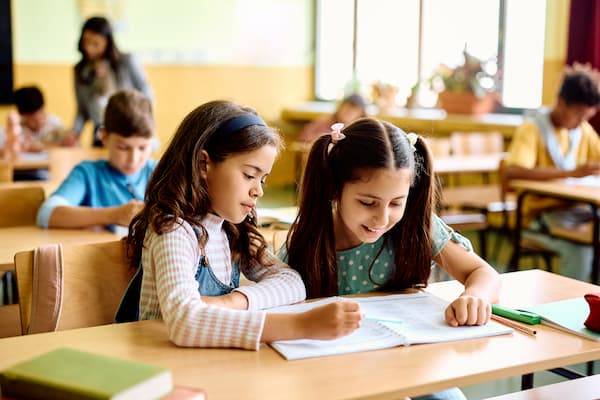
Conflict among students is an inevitable part of school life. From elementary to high school and even beyond, disagreements, misunderstandings, and disputes can arise between students. These conflicts can range from minor disagreements over toys or personal space in early education to more complex issues related to relationships, bullying, or academic competition as students age.
Dealing with student-to-student conflicts effectively is crucial for maintaining a healthy and productive learning environment. It helps resolve issues and teaches young learners essential life skills such as conflict resolution, communication, and empathy.
The first step in addressing student conflicts is encouraging open and honest communication. Teach students to express their feelings and concerns respectfully and assertively. Create a safe space to discuss their issues without fear of judgment.
Active listening is a crucial skill in conflict resolution. Encourage students to listen attentively to one another. This helps in understanding the other person’s perspective and feelings. By acknowledging the other person’s point of view, students can establish a foundation for resolution.
The Magic of Mediation in Schoolyard Disputes
In the dynamic environment of a school, students interact with one another on a daily basis. These interactions are only sometimes harmonious, and conflicts are bound to arise. That’s where mediation comes into play, offering an effective and constructive way to resolve disputes in a school setting. Whether it’s a disagreement over a shared toy in the preschool classroom or a dispute between high school students regarding academic competition, conflicts among students are common.
Why Mediation is Effective in Student Disputes
In the dynamic environment of a school, students interact with one another on a daily basis. These interactions are only sometimes harmonious, and conflicts are bound to arise. That’s where mediation comes into play, offering an effective and constructive way to resolve disputes in a school setting. Whether it’s a disagreement over a shared toy in the preschool classroom or a dispute between high school students regarding academic competition, conflicts among students are common.
- Empowers Students
Mediation empowers students by giving them an active role in resolving their conflicts. Rather than relying on authority figures to impose solutions, students learn to take responsibility for finding resolutions, fostering autonomy and self-efficacy. - Enhances Communication Skills
Effective communication is a critical life skill. Mediation allows students to express themselves, articulate their concerns, and listen actively to others. These communication skills extend beyond resolving immediate disputes serving students well in future relationships and endeavours. - Promotes Empathy
Mediation encourages students to see the situation from the other party’s perspective. Fostering empathy and understanding helps build more compassionate and empathetic individuals. Students learn to consider how their actions and words affect others. - Resolves Issues Amicably
Mediation focuses on finding win-win solutions. It emphasises collaboration and compromise rather than imposing decisions. Students often feel more satisfied with the outcomes by working together to find resolutions. - Prevents Escalation
Prompt and effective conflict resolution through mediation can prevent minor disputes from escalating into more significant issues or even violence. It helps maintain a positive and safe school environment. - Reduces Bullying
Mediation programs in schools can significantly reduce instances of bullying. Students who feel heard and understood are less likely to resort to bullying to resolve conflicts. Mediation provides an alternative to aggression. - Strengthens School Community
Mediation contributes to building a stronger sense of community within the school. When students and staff practice mediation, it promotes a culture of openness, understanding, and belonging. - Lifelong Skills
The skills learned through mediation are not limited to the school environment. Students can apply them in their personal lives, future workplaces, and when engaging with their communities. Mediation equips them with tools for resolving conflicts peacefully. - Customised Solutions
Every conflict is unique, and mediation allows for tailored solutions. It doesn’t rely on one-size-fits-all approaches but seeks to address the specific needs and concerns of the students involved. - Confidential and Safe
Mediation provides a confidential and safe space for students to express themselves. This privacy can encourage students to share more openly and honestly.
By integrating mediation programs into schools, we address immediate conflicts and equip students with valuable life skills that will serve them well personally and professionally.
Struggling with school disputes? Meet Fair Mediation – Your Bridge to Resolution!
At Fair Mediation, we’re dedicated to improving your school experience by effectively addressing conflicts. Our approach is designed to engage students in resolving issues with confidence and respect.
What sets us apart is our commitment to enhancing your communication skills, fostering empathy, and building a stronger sense of community within your school. Everything shared in our mediation sessions is treated with utmost confidentiality and safety.
By partnering with Fair Mediation, you’re not just resolving problems; you’re gaining invaluable skills that will benefit you now and throughout your life. We’re all about forging connections, not barriers, to create a brighter school environment. Let’s embark on this journey together!